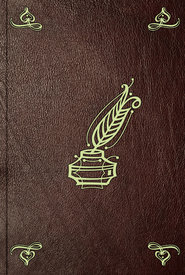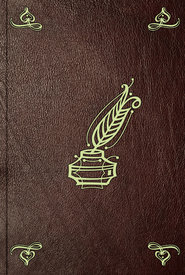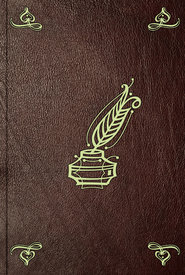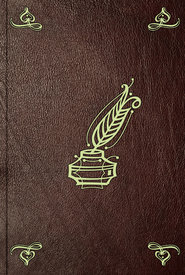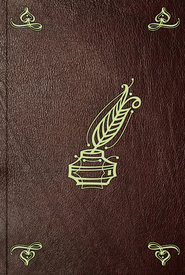По всем вопросам обращайтесь на: info@litportal.ru
(©) 2003-2024.
✖
Stories from the Faerie Queen, Told to the Children
Настройки чтения
Размер шрифта
Высота строк
Поля
The robber captain put Pastorella behind him, and fought for her. At last he was stabbed through the heart and fell dead. The sword that killed him pierced Pastorella’s arm, and she, too, fell down in a faint.
When she opened her eyes the robbers who were left had stopped fighting, and had lighted the candles, and were counting their dead and wounded. When she saw her dear father and mother and her friends lying cold and still beside her, she began to sob and cry. As soon as the robbers knew that she lived, they thrust her back into the darkest of their caves. The most cruel of all the robbers was her gaoler. He would not allow her to bind up her wound, and he gave her scarcely anything to eat or to drink. He would not even let her rest, and so, in pain and hunger and sadness, Pastorella passed her weary nights and days.
Now when Calidore got back from his hunting, he expected to hear the shepherds’ pipes, and their songs, and the bleating of the sheep, and to see Pastorella in her dainty gown and with flowers in her golden hair coming to meet him.
Instead of that, the place which had been so gay was sad and silent. The cottages were smouldering black ruins, and there was no living creature there.
Calidore wildly sought everywhere for some trace of Pastorella. But when he sought her in the woods and called ‘Pastorella … Pastorella …’, only the trees echoed ‘Pastorella.’ In the plains he sought her, but they lay silent and lonely under the stars, and they, too, only echoed ‘Pastorella … Pastorella…’
Week after week he searched for her, until one day he saw a man running across the plain. The man’s hair was standing up on his head as if he were in a terrible fright, and his clothes were in rags.
When he got near, Calidore saw that it was Corydon.
‘Where is Pastorella?’ eagerly asked Calidore.
Corydon burst into tears.
‘Ah, well-a-day,’ he said, ‘I saw fair Pastorella die!’
He then told Calidore all about the robbers’ raid, and all that had happened in that dreadful cave. Only one thing he did not know. He did not know that Pastorella was alive. He had seen her fall down, and he thought that she was dead.
So Calidore’s heart was nearly broken, and he vowed a vow that he would not rest until he had punished the wicked men who had killed Pastorella.
He made Corydon come with him to show him the way to the robbers’ island. At first Corydon was too frightened to go, but at last Calidore persuaded him. Together they set off, dressed like shepherds. But although Calidore carried only a shepherd’s crook, under his smock he wore his steel armour.
When at last they had reached the island, they found some sheep grazing, and knew them for some of those that had belonged to Melibœus. When Corydon saw the sheep he had taken care of in the days when he was most happy, he began to cry.
But Calidore comforted him, and they went on to where some robber shepherds lay asleep in the shade. Corydon wanted to kill them as they slept, but Calidore had other plans, and would not let him.
He awoke them, and they talked together. The robbers told him that they did not care to look after sheep, but liked better to fight and rob and kill. When Calidore and Corydon said that they would help them to keep the sheep, the robbers were glad. All day they stayed with the flocks, and at night the robbers took them home to their dark caves. There Calidore and Corydon heard news that made them glad, but made Calidore the more glad, for he loved Pastorella more than Corydon had ever done.
They learned that Pastorella was alive.
And so, day after day, they went on with their work, and waited and watched for a chance to set Pastorella free.
One night when the robbers had been away all day stealing and killing, and were all very tired, Calidore knew that the time had come to try to save Pastorella.
Corydon was too frightened to go with him. So all alone, at dead of night, Calidore went to the cave where the new robber captain, Pastorella’s gaoler, slept. Calidore had managed to get a little sword belonging to a robber, but he had nothing else to fight with.
When he came to the cave, he found the door fastened. He put his strong shoulder against it, and burst the door in. The crash awoke Pastorella’s gaoler, and he ran to see what it was. With one blow of his sword Calidore killed him. Then he called, till his voice rang through the gloomy cave, ‘Pastorella!’
Pastorella heard the noise, and lay trembling lest some new dreadful thing had come upon her. But when, again and again, Calidore called her name, her heart jumped for joy, and she ran out of the darkness right into her true knight’s arms. And Calidore threw his arms about her, and kissed her a thousand times.
The robbers had waked up, hearing the crash of the door, and the yell of the robber as he died, and Calidore’s cry of ‘Pastorella.’ Like a swarm of angry wasps they flocked to the door of the cave, but in the doorway stood Calidore with his sword, and slew every man who dared to try to kill him. He slew and slew until the doorway was blocked with dead bodies. Then those robbers that still lived were afraid to touch him, and went away to rest until morning.
Calidore also rested, and when daylight came he found amongst the dead robbers a better sword than the one he already had, and with that in his hand he walked out of the cave.
The robbers were lying in wait for him, and rushed at him from every side when he appeared.
But Calidore was like a lion in a herd of deer. With his sharp sword he thrust and smote, until the robbers who did not lie dead around him fled in terror, and hid themselves in their caves.
Then Calidore went back to where he had left Pastorella, and cheered and comforted her. Together they went through the robbers’ caves, and took the richest of their treasures of gold and precious jewels. All the sheep they gave to Corydon, who gladly drove them away.
Then Calidore took Pastorella to the castle of one of his friends, a noble knight, whose gentle wife was called Claribel.
Calidore had to go to hunt the monster that he was pursuing when he first met the shepherds, so he left Pastorella with the knight and his lady. Pastorella was so gentle and beautiful that they loved her for her own sweet sake, as well as for Calidore’s, and cared for her as if she was their own daughter.
An old woman who had always been Claribel’s maid was given as maid to Pastorella.
One morning as this woman helped her to dress, she noticed on Pastorella’s white breast a curious little mark. It was as if some one had painted on the fair skin a tiny purple rose with open petals. The old woman ran to her mistress, Claribel.
‘Your baby lives!’ she cried; ‘the little baby I left crying under the green bushes is the beautiful Pastorella who is to marry Sir Calidore!’
Claribel ran to Pastorella’s room, and looked at the little rose, and asked many questions. And when Pastorella had answered her, she was quite satisfied that she was indeed the baby-girl for whom her heart had been so hungry through all those years.
‘My daughter, my daughter, that I mourned as dead!’ she sobbed, as she held Pastorella in her arms and kissed her again and again.
When the knight knew that he was Pastorella’s father, he was as glad as Claribel. So they lived happily together until Calidore had slain the monster and come back to marry Pastorella.
Then instead of Pastorella, the shepherd’s daughter, with her little dainty gown and her wreath of wildflowers, he found a Pastorella in jewels, and silks, and satins, who was the daughter of a great knight and his lady, and grand-daughter of the Lord of Many Islands.
Yet the Pastorella who married brave Sir Calidore was evermore Pastorella, the simplest and sweetest bride that any knight ever brought to the court of the Faerie Queen.
VI
CAMBELL AND TRIAMOND
Once upon a time a fairy had a lovely daughter called Cambina, and three sons who were born on the same day.
The eldest son she named Priamond, the second Diamond, and the third Triamond.
Priamond was very stout and big, but he could not strike hard. Diamond struck very hard, but he was little and thin. But Triamond was tall and stout and strong as well.
Priamond used to fight on foot. Triamond fought on horseback. But Diamond could fight equally well on a horse or off it.
Triamond fought with a spear and shield. Diamond fought with a battle-axe. But Priamond could fight just as well with an axe as he could with a spear and shield.
Their fairy mother was so fond and so proud of her gallant sons, that she could not bear to think of one of them dying.
So she went to see three witches called the Three Fates, who lived in a dark place underground, and worked at their spinning-wheels day and night. She asked the Fates to let her sons have long, long lives. That they would not promise, but they promised that if Priamond died first, all his strength should go into the other two. And if Diamond should then die, all his strength and Priamond’s were to go into their brother Triamond.
Priamond, Diamond, and Triamond loved each other very dearly. When they grew up and all fell in love with the same lady, it did not make them less good friends.
The name of this lady was Canacee. She was very beautiful, and was the cleverest lady in all that land. She knew all about birds and beasts and plants and flowers, and was as witty as she was wise.
Many knights wished to marry her, and these knights were so jealous of each other that they were constantly fighting about her.
Canacee had a brother named Cambell, a wise young knight, who was sorry to see how often the knights fought with each other about his sister.
When she opened her eyes the robbers who were left had stopped fighting, and had lighted the candles, and were counting their dead and wounded. When she saw her dear father and mother and her friends lying cold and still beside her, she began to sob and cry. As soon as the robbers knew that she lived, they thrust her back into the darkest of their caves. The most cruel of all the robbers was her gaoler. He would not allow her to bind up her wound, and he gave her scarcely anything to eat or to drink. He would not even let her rest, and so, in pain and hunger and sadness, Pastorella passed her weary nights and days.
Now when Calidore got back from his hunting, he expected to hear the shepherds’ pipes, and their songs, and the bleating of the sheep, and to see Pastorella in her dainty gown and with flowers in her golden hair coming to meet him.
Instead of that, the place which had been so gay was sad and silent. The cottages were smouldering black ruins, and there was no living creature there.
Calidore wildly sought everywhere for some trace of Pastorella. But when he sought her in the woods and called ‘Pastorella … Pastorella …’, only the trees echoed ‘Pastorella.’ In the plains he sought her, but they lay silent and lonely under the stars, and they, too, only echoed ‘Pastorella … Pastorella…’
Week after week he searched for her, until one day he saw a man running across the plain. The man’s hair was standing up on his head as if he were in a terrible fright, and his clothes were in rags.
When he got near, Calidore saw that it was Corydon.
‘Where is Pastorella?’ eagerly asked Calidore.
Corydon burst into tears.
‘Ah, well-a-day,’ he said, ‘I saw fair Pastorella die!’
He then told Calidore all about the robbers’ raid, and all that had happened in that dreadful cave. Only one thing he did not know. He did not know that Pastorella was alive. He had seen her fall down, and he thought that she was dead.
So Calidore’s heart was nearly broken, and he vowed a vow that he would not rest until he had punished the wicked men who had killed Pastorella.
He made Corydon come with him to show him the way to the robbers’ island. At first Corydon was too frightened to go, but at last Calidore persuaded him. Together they set off, dressed like shepherds. But although Calidore carried only a shepherd’s crook, under his smock he wore his steel armour.
When at last they had reached the island, they found some sheep grazing, and knew them for some of those that had belonged to Melibœus. When Corydon saw the sheep he had taken care of in the days when he was most happy, he began to cry.
But Calidore comforted him, and they went on to where some robber shepherds lay asleep in the shade. Corydon wanted to kill them as they slept, but Calidore had other plans, and would not let him.
He awoke them, and they talked together. The robbers told him that they did not care to look after sheep, but liked better to fight and rob and kill. When Calidore and Corydon said that they would help them to keep the sheep, the robbers were glad. All day they stayed with the flocks, and at night the robbers took them home to their dark caves. There Calidore and Corydon heard news that made them glad, but made Calidore the more glad, for he loved Pastorella more than Corydon had ever done.
They learned that Pastorella was alive.
And so, day after day, they went on with their work, and waited and watched for a chance to set Pastorella free.
One night when the robbers had been away all day stealing and killing, and were all very tired, Calidore knew that the time had come to try to save Pastorella.
Corydon was too frightened to go with him. So all alone, at dead of night, Calidore went to the cave where the new robber captain, Pastorella’s gaoler, slept. Calidore had managed to get a little sword belonging to a robber, but he had nothing else to fight with.
When he came to the cave, he found the door fastened. He put his strong shoulder against it, and burst the door in. The crash awoke Pastorella’s gaoler, and he ran to see what it was. With one blow of his sword Calidore killed him. Then he called, till his voice rang through the gloomy cave, ‘Pastorella!’
Pastorella heard the noise, and lay trembling lest some new dreadful thing had come upon her. But when, again and again, Calidore called her name, her heart jumped for joy, and she ran out of the darkness right into her true knight’s arms. And Calidore threw his arms about her, and kissed her a thousand times.
The robbers had waked up, hearing the crash of the door, and the yell of the robber as he died, and Calidore’s cry of ‘Pastorella.’ Like a swarm of angry wasps they flocked to the door of the cave, but in the doorway stood Calidore with his sword, and slew every man who dared to try to kill him. He slew and slew until the doorway was blocked with dead bodies. Then those robbers that still lived were afraid to touch him, and went away to rest until morning.
Calidore also rested, and when daylight came he found amongst the dead robbers a better sword than the one he already had, and with that in his hand he walked out of the cave.
The robbers were lying in wait for him, and rushed at him from every side when he appeared.
But Calidore was like a lion in a herd of deer. With his sharp sword he thrust and smote, until the robbers who did not lie dead around him fled in terror, and hid themselves in their caves.
Then Calidore went back to where he had left Pastorella, and cheered and comforted her. Together they went through the robbers’ caves, and took the richest of their treasures of gold and precious jewels. All the sheep they gave to Corydon, who gladly drove them away.
Then Calidore took Pastorella to the castle of one of his friends, a noble knight, whose gentle wife was called Claribel.
Calidore had to go to hunt the monster that he was pursuing when he first met the shepherds, so he left Pastorella with the knight and his lady. Pastorella was so gentle and beautiful that they loved her for her own sweet sake, as well as for Calidore’s, and cared for her as if she was their own daughter.
An old woman who had always been Claribel’s maid was given as maid to Pastorella.
One morning as this woman helped her to dress, she noticed on Pastorella’s white breast a curious little mark. It was as if some one had painted on the fair skin a tiny purple rose with open petals. The old woman ran to her mistress, Claribel.
‘Your baby lives!’ she cried; ‘the little baby I left crying under the green bushes is the beautiful Pastorella who is to marry Sir Calidore!’
Claribel ran to Pastorella’s room, and looked at the little rose, and asked many questions. And when Pastorella had answered her, she was quite satisfied that she was indeed the baby-girl for whom her heart had been so hungry through all those years.
‘My daughter, my daughter, that I mourned as dead!’ she sobbed, as she held Pastorella in her arms and kissed her again and again.
When the knight knew that he was Pastorella’s father, he was as glad as Claribel. So they lived happily together until Calidore had slain the monster and come back to marry Pastorella.
Then instead of Pastorella, the shepherd’s daughter, with her little dainty gown and her wreath of wildflowers, he found a Pastorella in jewels, and silks, and satins, who was the daughter of a great knight and his lady, and grand-daughter of the Lord of Many Islands.
Yet the Pastorella who married brave Sir Calidore was evermore Pastorella, the simplest and sweetest bride that any knight ever brought to the court of the Faerie Queen.
VI
CAMBELL AND TRIAMOND
Once upon a time a fairy had a lovely daughter called Cambina, and three sons who were born on the same day.
The eldest son she named Priamond, the second Diamond, and the third Triamond.
Priamond was very stout and big, but he could not strike hard. Diamond struck very hard, but he was little and thin. But Triamond was tall and stout and strong as well.
Priamond used to fight on foot. Triamond fought on horseback. But Diamond could fight equally well on a horse or off it.
Triamond fought with a spear and shield. Diamond fought with a battle-axe. But Priamond could fight just as well with an axe as he could with a spear and shield.
Their fairy mother was so fond and so proud of her gallant sons, that she could not bear to think of one of them dying.
So she went to see three witches called the Three Fates, who lived in a dark place underground, and worked at their spinning-wheels day and night. She asked the Fates to let her sons have long, long lives. That they would not promise, but they promised that if Priamond died first, all his strength should go into the other two. And if Diamond should then die, all his strength and Priamond’s were to go into their brother Triamond.
Priamond, Diamond, and Triamond loved each other very dearly. When they grew up and all fell in love with the same lady, it did not make them less good friends.
The name of this lady was Canacee. She was very beautiful, and was the cleverest lady in all that land. She knew all about birds and beasts and plants and flowers, and was as witty as she was wise.
Many knights wished to marry her, and these knights were so jealous of each other that they were constantly fighting about her.
Canacee had a brother named Cambell, a wise young knight, who was sorry to see how often the knights fought with each other about his sister.







